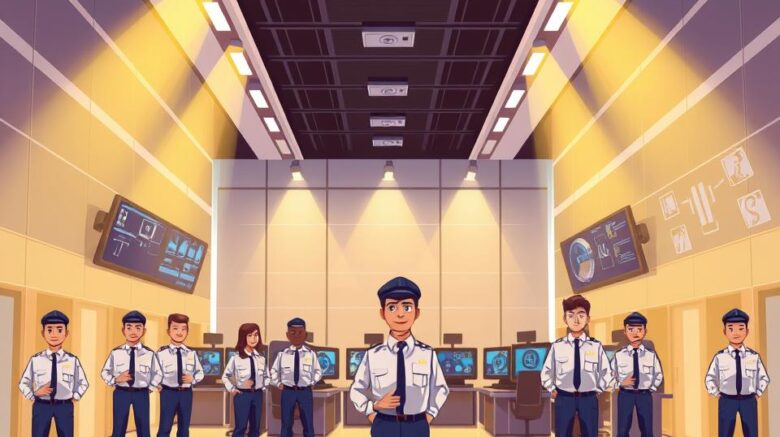Enhancing Security through Hospital Security Guards
Can you imagine that hospitals deal with around 30 violent incidents per day? This startling data emphasizes how vital Hospital Security Guards are. They secure patients, employees, and sensitive information. In today’s fast-changing healthcare world, robust Healthcare Facility Security is key. It focuses on forming safe zones where patients obtain services without threats of violence or information breaches.
Partnering with experienced firms like Divine Protection Services enhances Medical Center Security Services. This ensures safety is always a top priority, without sacrificing access. This write-up delves into how property patrol strategies and monitoring setups can substantially bolster security efforts. It tackles both internal and external threats effectively.

Essential Conclusions
- Hospital Security Guards are crucial for defending patients, staff members, and sensitive records.
- Healthcare Facility Security is vital to reduce violent episodes and protect privacy.
- Integrated security systems enhance the overall effectiveness of medical center security services.
- Collaboration with firms like Divine Protection Services ensures tailored security solutions.
- Innovative technologies support modern medical facility security approaches.
- Balancing accessibility and privacy is critical for effective hospital security measures.
The Importance of Hospital Security
Hospital security is paramount for the well-being of patients and staff and the defense of sensitive data. The rise in violence in medical settings highlights the need for strong Hospital Security Guards. Such officers play a key role in ensuring a safe environment and maintaining the rights and dignity of each individual.
Executing strong Healthcare Facility Security approaches is essential to avoid aggression. This assists in fostering a caring atmosphere, enhancing the experience for patients and families. It additionally secures conformity with rules such as HIPAA, enforcing secure access to safeguard Protected Health Information (PHI). These actions not only defend patients but also nurture trust between healthcare teams and their communities.
| Type of Security Measure | Importance | Compliance with Regulations |
|---|---|---|
| Access Control Systems | Block unauthorized access and entry | Essential for HIPAA compliance |
| Surveillance Cameras | Observe events and prevent illicit acts | Aligns with rules for secure environments |
| Emergency Response Plans | Offer immediate action during crises | Compliant with safety and emergency management guidelines |
| Training for Security Personnel | Prepare personnel with crisis management abilities | Ensures compliance with safety standards |
Committing to comprehensive security solutions and staff training is indispensable for protecting hospitals and health centers. These frameworks establish a secure, compliant environment, fundamental for delivering quality care to patients.
Function of Hospital Security Guards
Hospital security personnel perform a critical role in safeguarding hospitals. They guard access ways to block unapproved entry, respond to crises, and apply conflict management to forestall risks. After receiving instruction from Divine Protection Services, they detect and handle signs of aggression or unrest.
Their role is essential in upholding the safety and welfare of patients and personnel. They secure the hospital’s processes, critical for a healing setting. By delivering security, they enrich patient care and lower risks.
Cutting-Edge Technologies for Hospital Security
Current healthcare facilities incorporate Advanced Technologies to enhance security efforts. Medical Center Security Services adeptly incorporate AI-powered cameras to elevate monitoring efficiency. These systems deliver instant monitoring and insights, empowering personnel to react to incidents quickly.
A major element in Healthcare Security Solutions involves deploying access control systems. These solutions confine entry to restricted areas, ensuring that only sanctioned personnel can access crucial sections. By employing biometric authentication, hospitals can add an extra layer of security to patient information and valuable medical equipment.
Artificial intelligence security applications are pivotal for physical safeguarding. Face recognition and behavior analysis allow security teams to react quickly to security incidents. Enhanced video analytics underpin strategic decisions, ensuring uninterrupted surveillance of medical facilities. This contributes to a protected setting for staff and patients alike.
| Tech Tool | Use Case | Advantages |
|---|---|---|
| AI-driven Surveillance | Instant observation | Immediate threat identification |
| Access Control Systems | Restricted entry | Guarding important sections |
| Facial Recognition | Biometric verification | Stopping unapproved entry |
| Video Analytics | Operational oversight | Data-driven decision-making |
Advanced Technologies not only protect hospital assets but also contribute to creating a safe environment for all. By allocating resources to these innovative tools, medical centers can stay alert to security risks. This upholds superior patient care standards.
Healthcare Security Methods
Robust Healthcare Facility Security tactics are necessary to secure patients, personnel, and visitors within medical facilities. Executing detailed risk analyses is the basis of these approaches. By recognizing gaps, medical centers can devise customized procedures for different scenarios. This elevates their preparedness for any possible incidents.
It’s crucial to promote the reporting of suspicious activities and dangers. Medical centers need frameworks in place to react swiftly to those reports. This proactive view in Healthcare Facility Security cultivates a culture of shared safety.
Handling visitor flow is a fundamental element of Medical Center Security Services. Making sure that only permitted persons gain entry preserves a safe setting. Monitoring interactions between patients and healthcare professionals also minimizes risks. This creates a safer space for all. Presented below is a table detailing the main elements of successful security strategies.
| Security Element | Explanation | Benefits |
|---|---|---|
| Risk Assessments | Spotting weaknesses and evaluating potential hazards. | Improves preparedness and response times. |
| Incident Reporting | Encouraging the community to report suspicious activity. | Promotes prompt action against risks and raises alertness. |
| Visitor Management | Standards for tracking and managing facility entry. | Improves protection and lowers unauthorized entry. |
| Staff Training | Ensuring staff receive comprehensive security training. | Empowers staff to handle security incidents effectively. |
Preparing Security Personnel Competently
Comprehensive education of healthcare security teams is essential for ensuring safety in hospitals. Regular instruction assists personnel in coping with evolving risks. It moreover strengthens their competence in addressing multiple situations.
Divine Protection Services highlights nurturing excellent situational awareness in security officers. This involves acquiring de-escalation abilities for stressful engagements. Frequent drills and mock scenarios strengthen procedures. Employees develop skills to tackle threats promptly while safeguarding dignity and respect.
This training strategy for security teams extends past basic defense techniques. It fosters a culture of safety and professionalism in healthcare facilities. By focusing on core competencies, hospitals ensure their security teams can handle challenges effectively.
Meeting Compliance Requirements
Conforming to Regulatory Standards is indispensable for healthcare facilities that prioritize safety and trust. HIPAA, for instance, requires secure access controls to protect Patient Health Information (PHI). Such measures block illicit entry and prevent data breaches.
Healthcare providers can boost their compliance by adopting detailed policies. They encompass routine inspections, employee education, and explicit incident reporting methods. These steps not only ensure patient well-being but also foster community confidence.
Agencies like Divine Protection Services supply bespoke compliance strategies for hospitals. Their knowledge in Hospital Security Services guarantees that security staff are properly prepared to adhere to regulations.
Commitment to compliance reduces risks and builds a strong patient-provider relationship. An anticipatory approach to regulations advantages the whole healthcare framework.
Hospital Security Personnel in Action
Hospital Security Personnel play an essential role in preserving medical facility safety. Their efforts appear in numerous practical scenarios, showcasing their anticipatory methods. For instance, they oversee disputes in waiting rooms, swiftly settling them to avert escalation.
During critical situations, these guards accompany people to secure spots, aiding them when needed. This step protects vulnerable individuals and fosters a tranquil environment. Their coordination with police in crises underscores the importance of Professional Healthcare Security. They commonly serve as the frontline responders.
The training from Divine Protection Services prepares these guards to handle emergencies well. They learn to enforce rules while respecting everyone’s dignity. This fusion of authority with compassion establishes them as indispensable to the healthcare team. They commit to ensuring security and protection for everyone on site.
Customizing Security Solutions for Healthcare Facilities
Hospitals deal with particular security threats that call for a bespoke strategy. Customizing Security Solutions is key to effectively tackling these issues, ensuring a safe space for both patients and staff. Working with experts like Divine Protection Services enables hospitals to create security programs that fit their specific needs.
An all-encompassing security framework includes key topics like violence control and pharmaceutical security. Through advanced tech, facilities can enhance their security practices while following HIPAA guidelines. This often includes visitor management systems and flexible access control solutions that adapt to the facility’s evolving needs.
The function of Medical Facility Guards is equally important. They benefit from targeted training to deal with security episodes and ensure sustained vigilance. Their deployment discourages danger and provides peace of mind to staff and patients.
The table below shows how Customizing Security Solutions addresses various healthcare challenges:
| Security Concern | Custom Solution |
|---|---|
| Violence Prevention | Training for Medical Facility Guards in de-escalation techniques |
| Medication Security | Setting up protected drug cabinets and surveillance solutions |
| Visitor Management | High-level visitor vetting and credential issuance procedures |
| Access Control | Flexible access control platforms that adapt to operational demands |
By carefully planning and partnering with the right organizations, healthcare facilities can establish a strong security posture. This results from Tailoring Security Solutions to their specific criteria. Merging human supervision with tech tools greatly enhances protection, resulting in a safer, more efficient medical environment.
To Summarize
Safeguarding the security and welfare of patients, staff, and private information is fundamental in healthcare settings. Hospital Security Guards now use advanced technologies and training to combat modern threats. This development not only defends physical locations but also nurtures trust between patients and healthcare staff.
Tailored Healthcare Security Solutions enable hospitals to lead in the evolving security environment. Collaborating with seasoned organizations such as Divine Protection Services arms healthcare centers to manage safety challenges proficiently. By merging staff education with innovative technology, hospitals can cultivate a protected setting for treatment and care.
The health sector grapples with escalating risks, making professional security steps vital. Hospitals have to integrate these progressing strategies to fortify their environments and uphold operational honor.
